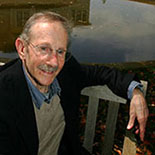 Philip Levine (January 10, 1928 – February 14, 2015) is a Pulitzer Prize-winning American poet best known for his poems about working-class Detroit.
Philip Levine (January 10, 1928 – February 14, 2015) is a Pulitzer Prize-winning American poet best known for his poems about working-class Detroit.
He taught for more than thirty years in the English department of California State University, Fresno and held teaching positions at other universities as well. He was appointed Poet Laureate of the United States for 2011–2012.
THE MERCY
Philip Levine
The ship that took my mother to Ellis Island
eighty-three years ago was named “The Mercy.”
She remembers trying to eat a banana
without first peeling it and seeing her first orange
in the hands of a young Scot, a seaman
who gave her a bite and wiped her mouth for her
with a red bandana and taught her the word,
“orange,” saying it patiently over and over.
A long autumn voyage, the days darkening
with the black waters calming as night came on,
then nothing as far as her eyes could see and space
without limit rushing off to the corners
of creation. She prayed in Russian and Yiddish
to find her family in New York, prayers
unheard or misunderstood or perhaps ignored
by all the powers that swept the waves of darkness
before she woke, that kept “The Mercy” afloat
while smallpox raged among the passengers
and crew until the dead were buried at sea
with strange prayers in a tongue she could not fathom.
“The Mercy,” I read on the yellowing pages of a book
I located in a windowless room of the library
on 42nd street, sat thirty-one days
offshore in quarantine before the passengers
disembarked. There a story ends. Other ships
arrived, “Tancred” out of Glasgow, “The Neptune”
registered as Danish, “Umberto IV,”
the list goes on for pages, November gives
way to winter, the sea pounds the alien shore.
Italian miners from Piemonte dig
under towns in western Pennsylvania
only to rediscover the same nightmare
they left at home. A nine-year-old girl travels
all night by train with one suitcase and an orange.
She learns that mercy is something you can eat
again and again while the juice spills over
your chin, you can wipe it away with the back
of your hands and you can never get enough.
===========
OUR VALLEY
Philip Levine
We don’t see the ocean, not ever, but in July and August
when the worst heat seems to rise from the hard clay
of this valley, you could be walking through a fig orchard
when suddenly the wind cools and for a moment
you get a whiff of salt, and in that moment you can almost
believe something is waiting beyond the Pacheco Pass,
something massive, irrational, and so powerful even
the mountains that rise east of here have no word for it.
You probably think I’m nuts saying the mountains
have no word for ocean, but if you live here
you begin to believe they know everything.
They maintain that huge silence we think of as divine,
a silence that grows in autumn when snow falls
slowly between the pines and the wind dies
to less than a whisper and you can barely catch
your breath because you’re thrilled and terrified.
You have to remember this isn’t your land.
It belongs to no one, like the sea you once lived beside
and thought was yours. Remember the small boats
that bobbed out as the waves rode in, and the men
who carved a living from it only to find themselves
carved down to nothing. Now you say this is home,
so go ahead, worship the mountains as they dissolve in dust,
wait on the wind, catch a scent of salt, call it our life.